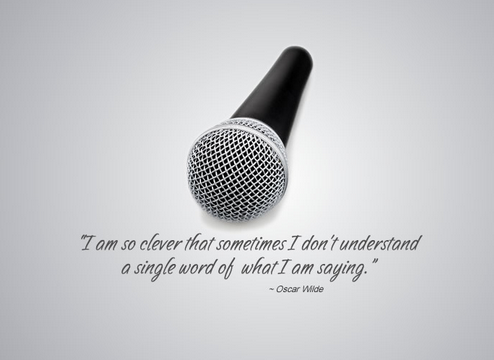Is it wrong to try to be clever in your marketing?
Most direct marketing experts and teachers will tell you that attempts at humor or cleverness are a bad idea. Most of them have experienced reality firsthand: people work hard to earn their money. Deciding where they’re going to spend or invest it is something they probably take seriously, not playfully.
On the other hand, most multimillion dollar image ad agencies can’t resist conjuring up the slickest ideas possible. Some of them will quote statistics “proving” how effective those 7- and 8-figure campaigns have been. Maybe they’re right, in some cases.
While I can’t state categorically that cleverness will ruin your the effectiveness of your marketing message, know for sure that you’re taking a pretty big risk.
Bacon-What?

A few days ago I saw a TV commercial advertising what seems to be a major event at Denny’s: Baconalia.
Being the dreadful nerd that I am, I realized that this was a attempted play on the word bacchanalia. Knowing the kind of person who reads this blog, there’s a good chance you noticed it, too. Wikipedia defines bacchanalia as “wild and mystic festivals of the Greco-Roman god Bacchus (or Dionysus), the wine god. The term has since come to describe any form of drunken revelry.” Just replace the wine with bacon and you have a good time waiting for you at Denny’s.
Here’s the problem: How obvious that play on words? What percentage of Denny’s average customers get it?
You know what probably happened. Some bookworm adwriter (who never had the responsibility to actually sell something with his ads) saw a chance to flex his creative muscles and he couldn’t help himself.
Granted, this advertisement may not hurt sales, but does the name Baconalia capture the attention and crystallize the desire for salty pigmeat in the minds of the people who see the commercial? More likely, it causes a moment of confusion. And as I say so frequently, confused people don’t buy.
Maybe I’m more upset about this than I should be. Maybe I’m being overly sensitive. But it seems like this happens way too frequently. Marketers and entrepreneurs think puns fill cash registers. They put too much emphasis on being clever.
Like Barefeet Shoes. Does that even make sense as the name of a shoe store?
Kill The Cleverness
Bill Bernbach, widely regarded as one of the 20th centuries most influential advertisers, said this: “Our job is to sell our clients’ merchandise … not ourselves. Our job is to kill the cleverness that makes us shine instead of the product. Our job is to simplify, to tear away the unrelated, to pluck out the weeds that are smothering the product message.”
Another of the greats, David Ogilvy said that “A good advertisement is one which sells the product without drawing attention to itself.”
This is where so many marketers get it wrong. The advertisement isn’t about the marketer — he shouldn’t be trying to win awards or show off his brilliance. The ad isn’t about the company selling the product, or even about the product itself. In the final analysis, the ad must be about the buyer and how his life will be changed for the better by purchasing the item advertised.
Marketing should be a spotlight in a darkened theater; content to be unseen, focused solely on creating the proper perspective for the product, enabling an audience to see the benefits available to them.
The copy you write should be transparent, invisible. If a potential client reads your copy and says, “Man, that was a great advertisement!” you’ve failed. You succeed when he asks urgently, “Where can I buy this product?”
The Most Important Exception
Cleverness is a great characteristic for a copywriter or marketer to have. Coming up with unique ideas and new ways to communicate them is essential. But that quick wit must be subjected to self-control and humility. All of those clever ideas have to take a back seat to selling power.
In your ads, you may need to be clever. But your cleverness must be invisible. Kinda like Seal Team 6, doing its job without being seen and disappearing into the night.
Here’s the short version: don’t sacrifice clear, effective communication in an attempt to be witty. Unless you’re selling tickets to a comedy show.

